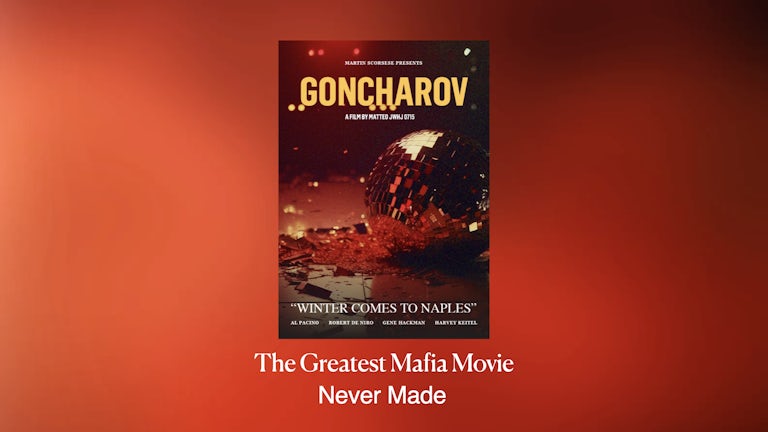Shopping Bag (0)
Shopping bag is empty


From a viral prank to a community of movie lovers coming together to create a lost masterpiece. Amplify’s ECD Alex Wilson takes a look at what happens when fandoms and communities harness the power of worldbuilding for a shared passion.
What’s the greatest mafia movie ever made? Goodfellas, Scarface, Gomorrah or The Godfather?
All wrong.
What if I told you it’s Goncharov, Martin Scorsese’s cinematic masterpiece?
Released in 1973, Robert De Niro stars as the titular protagonist, a former discotheque proprietor who travels to Naples with the ambition of becoming a mob boss shortly after the fall of the Soviet Union, also starring Harvey Keitel, Gene Hackman and Al Pacino. An award winning film that was added to the iconic Criterion Collection.
You’ve not seen it?
That’s because Goncharov doesn’t exist. It never did.
At least not in the traditional sense.
In August of 2020, a Tumblr user posted the above image; a pair of boots that seemed to imply the existence of a Martin Scorsese produced mafia movie, directed by ‘JWHJ0715’. One reposting of the image, accompanied with the line “this idiot hasn’t seen Goncharov”, sparked a mass movement on bringing the film to life.
This was closely followed by the below poster by beelzebub, which is what pushed hype around the film to new heights.
What followed was a fan-filled worldbuilding project to drag the movie into existence.
A collective fandom came together to create every aspect of the film and supporting collateral: scripts, musical scores, posters, costume design, the world, themes and even fake academic essays and reviews of the movie.
From Tumblr and beyond, film fans co-created the non-existent movie's storyline and world, building a virtual sandbox for them to co-author the film into being.
Even celebrities got in on the act, playing within the alternative reality, with Wonder Woman herself, Lynda Carter, posting a picture with Henry Winkler at the ‘Goncharov Premiere’.
What began as a playful online prank became an opportunity for those with a shared passion to worldbuild around a subject and cast they loved. There is even talk of a crowdfunding campaign to get the movie produced IRL.
But this passion for creativity doesn’t just live through IP that doesn't exist. There are examples of communities that keep the things they love alive. Just because a TV show isn’t still being produced, or the cameras stop rolling, it doesn’t mean the characters, storylines and worlds stop existing for fans and audiences.
The mission of website The Companion is to create a safe space for self-proclaimed geeks to get closer to the creators, actors and experts of the things they love across the sci-fi genre. One particular output is keeping the TV show Stargate alive for fans. Although it's a show that is no longer being produced, fans still write treatments, storylines and even scripts that the original cast have reunited to perform read throughs for.
On a slightly more surreal flex, Seinfeld, last aired in 1998, has an endless AI generated episode that is live streamed 24hrs a day from Twitch. ChatGPT provides the dialogue, and the basic premise is that the four key characters from the original show now exist in a 1990s computer game, where they must now spend all eternity.
And, in a display of how the emerging technology is perhaps not ready to be left to its own devices, the stream was recently taken off air after a technical issue with the content moderation system failed to prevent some transphobic remarks being made.
So, even though the writers may have stopped writing, the cameras may have stopped shooting, and the actors have stopped playing the roles, whether through emerging technology or fan-powered communities, these worlds can continue to exist beyond the frame of a TV set.
What’s next? Could we see an actual production of Angels with Filthy Souls, the parody black and white movie Kevin McCallister uses to foil the intruders in Home Alone? I’m sure we’d all pay to see Arnold Schwarzenegger’s step back into the role of Jack Slater playing Hamlet in Last Action Hero; "To be or not to be. Not to be.”
So, what can brands looking to worldbuild or co-create with their audiences learn from this? Handing the keys over - or at least co-authoring the future of their IP or worlds - is a powerful tool to ensure authentic engagement and buy-in from creators and audiences alike. Who knows where they will take it, or how they will do it?
To read the full article visit Shots.